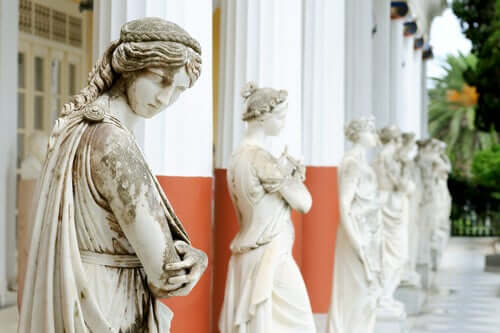The myth of the muses is one of the best known of antiquity, these divine beings are still considered a source of inspiration for artists of the arts and sciences, in fact, the word muse gave rise to the words music and museum.
According to different versions of the myth of the muses, they were the natural companions of Apollo, god of music and the arts. Apollo had novels with all the muses, at different times, and from these poaching loves many descendants were born.
- The myth of the muses says that they were cheerful and festive young men.
- Who came to earth to whisper creative ideas in the ears of mortals.
- That if they could hear them they would produce wonderful works that were admired.
- The muses ended up not creating anything.
“The muses don’t collect royalties. ” -Joaquín Sabina-
The muses were the daughters of Zeus, the god of Olympus, and Mnemosyne, a titanid who personified memory; she, in turn, was the daughter of Gaia, Mother Earth, and Uranus, personification of heaven. Mnemosyne and Zeus are said to have been together for nine nights, and every night a muse was born.
Mythology says that in the underworld there was a river called Mnemosyne, which ran along another called Lete. Many mortals were invited to drink on the Lete River before being reincarnated into a new being; the waters of this spring made them forget their previous lives and start over.
On the other hand, the myth of the muses says that only a few selected were invited to drink on the Mnemosine River, who could remember their previous lives, becoming visionaries and prophets in their next incarnation.
Although there are stories that speak of other muses, classical mythology speaks of nine muses, each responsible for an area of knowledge or artistic creation, it is said that if the good muse visited the creator, she would have sudden and wonderful revelations to complete her work. The nine muses of classical mythology are:
If the myth of the muses was very important to the Greeks, these beings do not often appear in the stories of the gods, when they appear they are secondary characters. Despite this, his inspiration was considered fundamental to the action of all the protagonists.
King Piero de Pieria in Thrace would have had nine daughters with a great gift for singing. Their art was so beautiful that they decided to go to Mount Helicon, where the muses lived, and challenge them. The muses gladly accepted.
When the nine young women began to sing, all the birds were dumb, their singing was so beautiful that all nature fell silent, then it was the turn of the muses. When they sang their songs, even the stones wept. Having won the contest, the muses decided to turn the nine girls into birds to punish their arrogance.

